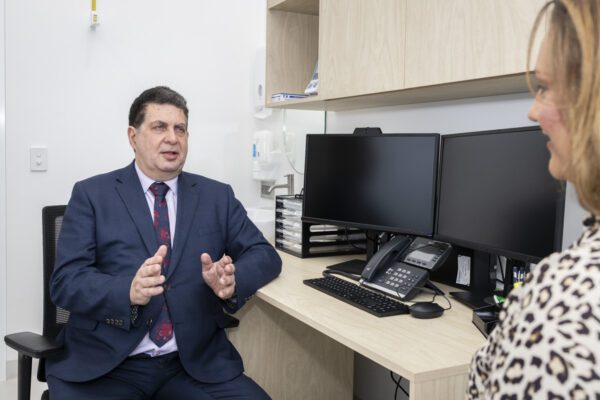It comes as no surprise that one of our most asked questions by prospective guests is what sort of food they can expect to indulge in as a part of their stay at The Banyans, and understandably so – food creates connection, friendships, love, and even longevity of life.
There is simply no denying it’s connotation with mood and with medicine, two age-old notions that we wholeheartedly believe in and advocate for at The Banyans.

Knowing what’s good for us is one thing, putting this theory into practice in our daily lives, however, is another entirely, as evidenced by recent studies1. Alarmingly, data shows that the Australian population remain chronic under-consumers of one of our fundamental sources of nutrition – fruit and vegetables. That’s why The Banyans are getting behind National Nutrition Week this week, to raise awareness about the important link between nutrition and mental health.
What is the message of National Nutrition Week?
The educational focus for this year’s National Nutrition Week2 is ‘Try for 5’ – a catchy and easy to remember tagline encouraging each and every one of us to consume a minimum of five serves of vegetables per day, which, according to National Nutrition Week organisers, might look as different as ½ a potato to one person or a cup of salad to another. The goal – to shift our collective mindset toward investing in our health, with the message that ‘every veg counts’.
What does National Nutrition Week have to do with mental health?
Understanding the link between nutrition and the manifestation of physical disease might prove easy, but what about its implications for our mental health, specifically the correlation between nutrition and depression?
Clinical research3 continues to validate and emphasise the role of adequate vegetable intake in the prevention of major illness such as Type II Diabetes, Hypertension, Osteoporosis, and Cancer. However, there is now substantial evidence related to the inverse relationship between high quality nutrition and decreased risk of psychological conditions, cognitive disorders, and even suicidal ideation. The reason being? – the potent and powerful levels of fibre, essential vitamins and minerals, antioxidants, and phytochemicals contained within vegetables. More than just the nutritional content of the vegetables themselves, is the impact they have on improving our microbiome which in turn produces many beneficial molecules to lower inflammation and support our mental health.
Across the board, the essential role played by diet in depression is resoundingly clear.
Learn more from our in-house experts on the chemical link between nutrition and depression here.
The Banyans food and mood philosophy
In line with further findings4 identifying correlations between vegetable consumption habits and overall health literacy, at The Banyans, our dedicated team of nutritionists, dietitians and gourmet chefs recognise that education is key. Not only do we offer guests of our Residential Programs gourmet, nutritionally dense options for every meal of the day throughout the entire duration of their stay, considering their unique recovery needs, but also one-on-one nutritional/dietary consultations and testing, and cooking classes, to help support guests address this area of lives, and beyond, with renewed passion and invigoration.
Learn more about our nutritional philosophy and practice here.

And in case we’ve made you hungry, here is one of our tasty vege meals to try at home during this year’s National Nutrition Week.
If you may be experiencing symptoms of poor mental health we encourage ‘trying for 5’ this National Nutrition Week, you can even keep a diary and keep track of any changes you notice. Please remember that if you are suffering from mental health challenges to seek professional help sooner rather than later. Our expert team are available 24/7 to have a confidential conversation. Call 1300 226 926, or make an enquiry below.
This article was reviewed by Tammy Spiller, Clinical Nutritionist at The Banyans Healthcare.
REFERENCES
1Rogers, A., Wilkinson, S., Downie, O., & Truby, H. (2021). Communication of nutrition information by influencers on social media: A scoping review. Health Promotion Journal of Australia, 33(3), 657-676. https://doi.org/10.1002/hpja.563
2Try for 5. (2023). National nutrition week 15 – 21 October 2023. Nutrition Australia. https://www.tryfor5.org.au/
3Liu, X., Yan, Y., Li, F., & Zhang, D. (2016). Fruit and vegetable consumption and the risk of depression: A meta-analysis. Nutrition, 32(3), 296-302. https://doi.org/10.1016/j.nut.2015.09.009
Zhou, Y., Wang, J., Cao, L., Mengyuan, S., Liu, H., Zhao, Y., Xia, Y. (2022). Fruit and vegetable consumption and cognitive disorders in older adults: A meta-analysis of observational studies. Frontiers in Nutrition, 9(871061), 1-11. https://doi.org/10.3389/fnut.2022.871061
Hwang, C., & Choi, S. (2021). Association between consumption of fruits and vegetables with suicidal ideation. Public Health Nutrition, 25(5), 1285-1290. http://doi.org/10.1017/S1368980021004687
4Oberne, A., Vamos, C., Wright, L., Wang, W., & Daley, E. (2019). Does health literacy affect fruit and vegetable consumption? An assessment of the relationship between health literacy and dietary practices among college students. Journal of American College Health, 70(1), 134-141. https://doi.org/10.1080/07448481.2020.1727911





